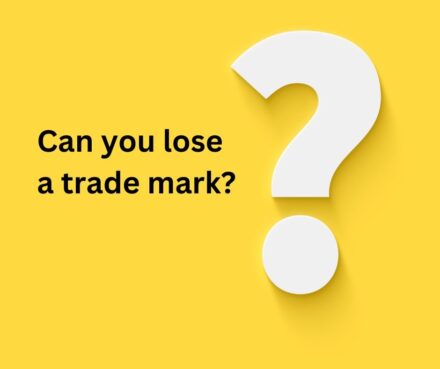
Can I lose my trade mark?
5th July 2023 by Tiff Elmer
Hooray! You have made it through the trade mark registration process and you have your registration certificate – congratulations!
At this point you might be thinking, that’s it, I can sit back and relax as there is nothing else to do. However, there are five key ways you could actually lose your trade mark that you should know, if you did not already.
- USE IT
This might seem very obvious, but you must use your trade mark in the course of your business i.e. on your website, products, or merchandise for example depending on what it is you do.
A third party could attempt to have your trade mark revoked in the UK if you have not used it for five or more years. This could also apply in part if you have not been using your trade mark for all of the goods and / or service is it protected.
You also need to use the mark as registered (i.e., in the exact form it appears on the trade mark register and registration certificate). Variations between the trade mark will sometimes be acceptable, provided the distinctive character of the mark remains the same. However, if the appearance of your mark changes over time, you should consider whether you need to file a new application and in most cases, you probably do.
- MISLEADING
Once your mark is registered, a third party could attempt to revoke your mark if they consider it misleads the public which might be in relation to its characteristics, quality, quantity or geographical origin. For example, the trade mark MOVENPICK OF SWITZERLAND was revoked because the goods were produced in Germany, not Switzerland and misled the public as to its geographical origin. Similarly, an ice-cream branded VANILLA SNOW but flavoured chocolate might be deemed misleading.
We recommend seeking legal advice from the outset to ensure you mark is not misleading and avoid the risk of being revoked in the future.
- GENERIC
A trade mark is a sign which differentiates your business from another, but once a mark becomes generic it can no longer do that.
Things which can lead to a trade mark becoming generic is allowing a mark which is used as a verb for example “hoover the floor” as a noun rather than an adjective. We all famously know the term “Hoover” which is now generic and widely used term for what is formally a “Hoover Vacuum Cleaner.”
A third party could try to have your registration cancelled as a result of your actions or inactivity of your trade mark becoming common name in the trade for the goods and / or services your trade mark is protected (i.e., becoming generic).
You should ensure your mark is not being used or referred to generically, but if it is, you must take steps to try and prevent this from happening through your enforcement rights, tighter controls over any licensees and licences you may have in place and / or educating the public.
- INVALIDATION
A third party has the right to attempt to invalidate your trade mark which essentially means it should never have been registered in the first place.
A third party may wish to attempt to invalidate your trade mark because they have a trade mark which existed before yours and is similar or identical to their mark. The third party can try to invalidate your registration so that it ceases to never have existed.
Alternatively, a third party could also invalidate your trade mark under grounds such as being non-distinctive or descriptive. The general rule is trade marks which are descriptive or non-distinctive are likely to be rejected by the trade mark registry, for example, the name FOOT CREAM for a foot cream product as you cannot monopolise this common used name. The registry should, as part of the application process, reject applications like this. However, in the event trade marks like this are registered, a third party can have strong grounds to invalidate your mark because really, under trade mark law, it should not have been registered in the first place.
- RENEWAL DEADLINE
Trade marks are due for renewal in the UK every 10 years on the anniversary of its filing date. You must make a note of the deadline and remember to renew your registration making applicable payments to the registry. You can renew your mark 6 months before the renewal deadline and so as long as you renew it on or before each due date, you trade mark will last forever. If you do not renew your registration, it will lapse.
If you are concerned about losing your registered trade mark or would like to talk through any of the above points, then please contact us at t.elmer@laceyssolicitors.co.uk or on 01202 377 814.



